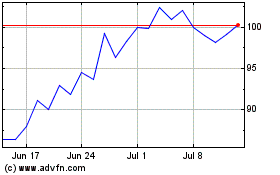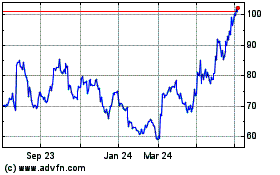Shareholder pressure Tuesday claimed its most high-profile
victim in Aviva PLC's (AV.LN) Andrew Moss--and while experts
predict that the wave of protest will continue, some say that
investor action could backfire and leave companies rudderless.
Over the past few weeks, investors in Europe have ramped up
pressure against a raft of companies, calling for cuts in what they
perceive as excessive executive pay in the light of poor
performance. Remuneration packages at Barclays PLC (BCS), UBS AG
(UBS) and Credit Suisse (CS), among others, have been attacked with
significant "no" votes in recent annual meetings.
However, Aviva became the fourth FTSE 100 company ever to have
its remuneration report rejected, and Tuesday the British insurance
group said that Chief Executive Moss, whose GBP2.69 million pay
packet was also rejected in the non-binding vote, would stand down
with immediate effect.
Moss' departure follows that of Trinity Mirror PLC's (TNI.LN)
chief executive, Sly Bailey, and David Brennan at U.K. drug giant
AstraZeneca PLC (AZN.LN), all three quitting as investor anger
centers on executive pay perceived as excessive in the light of
company underperformance.
Unlike Bailey and Brennan though, Moss' exit is immediate and,
despite interim appointments, could leave a void at the insurer at
a time when insurers are struggling to meet new capital
requirements and as the euro-zone crisis sees little signs of
abating. If shareholders continue to vent, triggering immediate
exits, other companies could be left headless, and shareholders
should be aware of the consequences of their actions, experts
say.
"Shareholders don't want to see companies without a leader," a
spokesman for the Association of British Insurers said. The
group--whose members, through their investments, control about 12%
of the U.K. stock market--flags matters that shareholders should
consider, although it doesn't directly give vote
recommendations.
The fact that shareholders could be left in a worse position
than previously was even raised by the U.K. Shareholders
Association, a champion of shareholder rights.
"There is a risk that if shareholders attack the board or a CEO
on pay or any other matter that he quits," Roger Lawson of the
group said. "And the increase in shareholder pressure could trigger
more immediate exits."
Market reaction reflected concern over the break in leadership
at Aviva, with shares closing the day virtually flat at 303 pence
after having risen as high as 320 pence, or nearly 6%, immediately
after the announcement of Moss' resignation.
Advisory shareholder group Pensions Investment Research
Consultants, or PIRC, said it specifically advises companies to
have succession plans in place in the event that top executives are
forced out.
"Shareholders and companies alike know the risks and
consequences that can follow if investors are unhappy," said PIRC's
Tom Powdrill. "Having no plans in place can only exacerbate the
situation."
Still, most observers see increased shareholder participation as
a good development.
One of the top 10 investors in Aviva said his firm has taken
heed from former City Minister Paul Myners, who said investors
should be more active in their relationships with the companies
they invest in. "Lord Myners was rightly against absentee
shareholders," the investor said.
"The previous government seemed to have an agenda of fairness,
and we agree that we need to see that in executive remuneration,
and putting pressure as institutional shareholders to top
management [is important]," the investor added.
Despite the calls for active engagement, the level of
shareholder voting has remained steady over the past five to 10
years, according to Capita Registrars, the U.K.'s largest provider
of share registration services.
"Capita data shows there has been no increase in shareholder
voting, but there should be, and we think there now will be, not to
force CEOs out of their jobs, but to help shape the future of the
companies shareholders invest in a positive way," Capita CEO
Charles Cryer said.
The apparent rise in shareholder voting at recent AGMs is likely
limited to specific cases where there has been strong publicity, a
lot of controversy and talk about excessive pay, a Capita
representative added.
Investors in U.K. companies are set to have their ammunition
boosted under a government proposal to give investors binding votes
on corporate pay policies. If implemented the plan, proposed by
business secretary Vince Cable, will refer to remuneration payable
in the future--the recent nonbinding votes have been on last year's
pay.
The U.K. government won't be releasing any specific details
regarding executive pay in the Queen's speech when she opens
Parliament on Wednesday and sets out the government's legislative
plans, but the issue is set to be mentioned.
Meanwhile, in France, where shareholders cannot currently vote
during AGM's on executive pay, the law is set to change shortly
with the introduction of legislation, said Didier Cornardeau, who
runs an association that represents shareholders.
In Germany, spokesman Juergen Kurz from the retail investor
association DSW said Tuesday that investors' influence on the
management board's remuneration policy at AGMs in Germany isn't as
large as in the U.K. as say-on-pay votes aren't that established
yet and as executive payments aren't at the top level of British
counterparts.
"The say-on-pay vote has been introduced in Germany over the
last about three years," he said, adding that, although single
investors have uttered concerns over management payments in some
cases, the majority of the shareholders have voted in favor of it
at past AGMs.
U.K.-based investor Hermes, for instance, criticized Deutsche
Bank AG (DBK.XE) on a number of issues, including succession
planning for the outgoing chief executive, failure to take concerns
regarding remuneration policy into account, and its approach to
sustainability and reputation issues. In a counterproposal to the
AGM agenda, Hermes asked shareholders not to approve the
supervisory board's performance.
VW AG (VOW.XE) Chief Executive Martin Winterkorn has recently
triggered public furor for having earned about EUR17 million in
2011, making the company's work council to think about a limit for
executive payments.
But bosses in the U.K. will likely remain under pressure and
several others could join the likes of Moss, Bailey and Brennan.
Even where company performance is relatively strong shareholders
are flexing their muscles.
On Tuesday, U.K. bookmaker William Hill PLC's (WMH.LN) CEO Ralph
Topping narrowly missed a rejection of a resolution that he receive
a GBP1.2 million "retention bonus." Just under 50% of shareholders
opposed the resolution which also includes an 8.3% pay rise.
Bosses at U.K. consumer goods giant Unilever PLC (ULVR.LN) and
utility Centrica PLC (CNA.LN) face investor votes at upcoming
meetings this week. Meanwhile, Man Group PLC's (EMG.LN) CEO Peter
Clarke who avoided a shareholder revolt despite much criticism at
the company's AGM, could yet come under more pressure if shares
continue to fall at the hedge fund group which has lost 66% of its
value over the year.
Meanwhile, Moss doesn't leave empty-handed. Aviva said in a
separate statement late Tuesday that Moss will receive around
GBP1.75 million, which includes a 12-month salary, contribution to
his pension, a lump-sum settlement, and 75% of the shares awarded
to him in 2009.
-By Marietta Cauchi, Dow Jones Newswires; +44 207 842 9241;
marietta.cauchi@dowjones.com
(Vladimir Guevarra and Max Colchester in London and Eyk Henning
in Frankfurt contributed to this article. )
Reach (LSE:RCH)
Historical Stock Chart
From Mar 2024 to Apr 2024

Reach (LSE:RCH)
Historical Stock Chart
From Apr 2023 to Apr 2024
